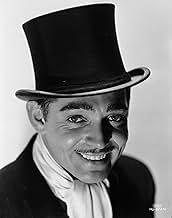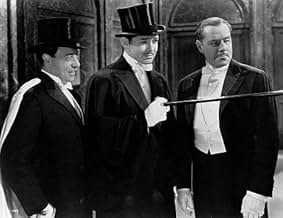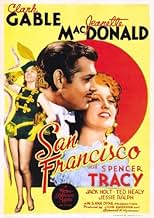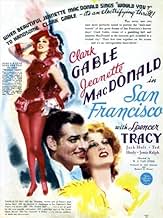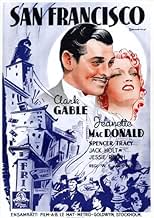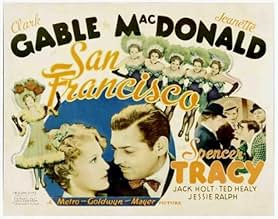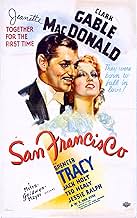CALIFICACIÓN DE IMDb
7.1/10
6.4 k
TU CALIFICACIÓN
La cantante de ópera Mary Blake huye de la miseria y busca cobijo en Blackie Norton, un empresario de San Francisco que le proporciona trabajo. Inevitablemente, surge una estrecha relación e... Leer todoLa cantante de ópera Mary Blake huye de la miseria y busca cobijo en Blackie Norton, un empresario de San Francisco que le proporciona trabajo. Inevitablemente, surge una estrecha relación entre ambos.La cantante de ópera Mary Blake huye de la miseria y busca cobijo en Blackie Norton, un empresario de San Francisco que le proporciona trabajo. Inevitablemente, surge una estrecha relación entre ambos.
- Dirección
- Guionistas
- Elenco
- Ganó 1 premio Óscar
- 5 premios ganados y 6 nominaciones en total
Charles Judels
- Tony
- (as Charles Judells)
Warren Hymer
- Hazeltine
- (as Warren B. Hymer)
- Dirección
- Guionistas
- Todo el elenco y el equipo
- Producción, taquilla y más en IMDbPro
Opiniones destacadas
John Hoffman (my father) was responsible for the Great Earthquake scene and a number the other montage sequences in the film. A friend of his, the film preservationist David Shepard, tells me the film had already been shot, but the studio execs weren't happy with it. So, they handed it over to the then head of MGM's Montage Department, John Hoffman, to see if he could salvage it. Hoffman rewrote, directed and edited many of the scenes. The result: five Oscar nominations (including 'Best Picture') and one win ('Best Sound') released in 1936, it preceded the introduction of the Oscar for Special Effects award by a few years.
A few years ago, when the Academy Awards Ceremony featured a review of the greatest disaster films ever made, I was disappointed to note that San Francisco hadn't been included. Still, from reading the reviews posted here, it's great to see how many people still appreciate it today.
A few years ago, when the Academy Awards Ceremony featured a review of the greatest disaster films ever made, I was disappointed to note that San Francisco hadn't been included. Still, from reading the reviews posted here, it's great to see how many people still appreciate it today.
San Francisco, like so many other films from this era, just reminds me again how movies today have lost the art of the build-up. They just hit you over the head with mind-numbing action from frame one. Hollywood(and audiences of today) would do well to watch classics like "San Francisco", where story takes precedence over special effects and when the effects do come, they are in service to the story. And they mean so much more and have so much more impact when held back until the last possible moment. Why can't we allow ourselves to be immersed in the story? Or are we just too impatient for it now?
This is a great old film. I have seen it several times, and enjoy it every time. I think Jeanette MacDonald is beautiful, and what a voice! I love to hear her sing.
My mother gave me my middle name of Jeanette after her. It is interesting that a film with so much "fancy" singing
could have been so popular. The general public must have had more class then than now.
It is good to see the "oldies." Many of them are better than today's films.
I certainly like this one.
My mother gave me my middle name of Jeanette after her. It is interesting that a film with so much "fancy" singing
could have been so popular. The general public must have had more class then than now.
It is good to see the "oldies." Many of them are better than today's films.
I certainly like this one.
"San Francisco" is a very good classic picture. It's in many ways kind of similar to "In Old Chicago", which came out a year after this film. Both films have love stories, both have beautiful sets, and both climax with a disaster that really did take place in their respective cities. "San Francisco" takes place in the mid-1900s. Clark Gable and Spencer Tracy are two of the thousands of people living in the city that was tragically rocked by the massive earthquake of 1906. Like "In Old Chicago", the disaster recreation here is impressive. The film tends to drag a little from time-to-time, but that's only a minor quarrel to an otherwise classy movie. All-in-all, I was pretty entertained by "San Francisco".
*** (out of four)
*** (out of four)
As in the '70s, disaster films were all the rage in the '30s, with "Hurricane," "The Rains Came," "In Old Chicago," and, of course, 1936's "San Francisco" which certainly sent the other studios running to destroy anything they could. The film stars Clark Gable, Jeannette MacDonald, and Spencer Tracy as three citizens of that beautiful city on April 18, 1906, when the big earthquake struck.
Gable plays Blackie Norton, a quintessential role for him - a tough, charming rogue who runs The Paradise Club. MacDonald is the lovely and talented Mary Black who arrives there looking for work, and Spencer Tracy is Father Tim, who is Blackie's conscience (so he ignores him) and Mary's moral compass. Mary is torn between two loves - her love for Blackie and her love for opera. Burley (Jack Holt) wants her contract from Blackie so he can star her at the Tivoli Opera, but in all things, she suppresses her own desires so that she can stay with Blackie. She finally does leave but returns...only to leave again after an ugly confrontation between Blackie and Father Tim. Things get a lot uglier at an annual contest - and that's when the chandelier starts moving back and forth.
It's amazing what the films in the pre-computer age were able to do with special effects because the earthquake in "San Francisco" is dazzling, spectacular, and downright scary. Given the horrors of 9/11 and Katrina, one is drawn into the devastation and suffering as people search for loved ones, watch their houses fall, go crazy, and see their beloved city dynamited because there's no water to stop the raging fires. 70 years later, it's all way too close to home.
As good as he always was with Gable, Spencer Tracy did not have much of a role as the good father, but he's excellent. MacDonald poses a problem. Normally, she plays a diva or spitfire, and she did those roles beautifully. But Mary Blake is a modest and religious woman who speaks softly and sublimates her own desires for the man she loves. It doesn't ring true, and it doesn't work opposite the volatile Blackie of Gable's. If Mary had been more like other roles she played, MacDonald probably would have had good chemistry with him. As it is, they don't make much of a couple. Her singing is pretty until she hits the opera stage - with the combination of the tinny sound system in those days and the way women were trained on high notes then, the end result isn't good. She sings "The Jewel Song," which she often did in concert, the finale of "Faust," and "Sempre Libera." MacDonald was a lyric coloratura and suited to the demands of the opera stage in the '30s, but today she sounds dated as standards have changed.
This is a great film to see to appreciate the artistry of the early technicians. The effects in "San Francisco" hold up against anything that came 40 years later. The ending is pure Hollywood hokum, but very stirring. It gave this viewer goosebumps. Don't miss Hollywood at its very best.
Gable plays Blackie Norton, a quintessential role for him - a tough, charming rogue who runs The Paradise Club. MacDonald is the lovely and talented Mary Black who arrives there looking for work, and Spencer Tracy is Father Tim, who is Blackie's conscience (so he ignores him) and Mary's moral compass. Mary is torn between two loves - her love for Blackie and her love for opera. Burley (Jack Holt) wants her contract from Blackie so he can star her at the Tivoli Opera, but in all things, she suppresses her own desires so that she can stay with Blackie. She finally does leave but returns...only to leave again after an ugly confrontation between Blackie and Father Tim. Things get a lot uglier at an annual contest - and that's when the chandelier starts moving back and forth.
It's amazing what the films in the pre-computer age were able to do with special effects because the earthquake in "San Francisco" is dazzling, spectacular, and downright scary. Given the horrors of 9/11 and Katrina, one is drawn into the devastation and suffering as people search for loved ones, watch their houses fall, go crazy, and see their beloved city dynamited because there's no water to stop the raging fires. 70 years later, it's all way too close to home.
As good as he always was with Gable, Spencer Tracy did not have much of a role as the good father, but he's excellent. MacDonald poses a problem. Normally, she plays a diva or spitfire, and she did those roles beautifully. But Mary Blake is a modest and religious woman who speaks softly and sublimates her own desires for the man she loves. It doesn't ring true, and it doesn't work opposite the volatile Blackie of Gable's. If Mary had been more like other roles she played, MacDonald probably would have had good chemistry with him. As it is, they don't make much of a couple. Her singing is pretty until she hits the opera stage - with the combination of the tinny sound system in those days and the way women were trained on high notes then, the end result isn't good. She sings "The Jewel Song," which she often did in concert, the finale of "Faust," and "Sempre Libera." MacDonald was a lyric coloratura and suited to the demands of the opera stage in the '30s, but today she sounds dated as standards have changed.
This is a great film to see to appreciate the artistry of the early technicians. The effects in "San Francisco" hold up against anything that came 40 years later. The ending is pure Hollywood hokum, but very stirring. It gave this viewer goosebumps. Don't miss Hollywood at its very best.
¿Sabías que…?
- TriviaClark Gable did not want to make this film but he was at the mercy of MGM studio head Louis B. Mayer, who had just paid off one of his numerous paramours.
- ErroresAs Blackie walks away from a building being blown up (actually a process shot), Clark Gable's head becomes momentarily transparent.
- Citas
Jack Burley: [referring to Mary Blake] Well, there's no law against an opera singer being slender, young and beautiful.
- Créditos curiososPrologue: "San Francisco--guardian of the Golden Gate--stands today a Queen among seaports--industrious, mature, respectable. But perhaps she dreams of the Queen and city she was--splendid and sensuous, vulgar, and magnificent--that perished suddenly with a cry still heard in the hearts of those who knew her, at exactly 5:15 a.m. April 18, 1906."
- Versiones alternativasAfter initial premiere, the manager of the Paramount Theater in San Francisco added to the downbeat ending a few shots showing the Golden Gate Bridge being built. Seeing the positive public reaction, MGM decided to have the sequence added to all other prints in release.
- ConexionesEdited into What Price Safety! (1938)
- Bandas sonorasSan Francisco
(1936)
Music by Bronislau Kaper and Walter Jurmann
Lyrics by Gus Kahn
Played during the opening credits and often in the score
Sung by Jeanette MacDonald (uncredited)
Reprised by her and others at a political rally and at the end
Selecciones populares
Inicia sesión para calificar y agrega a la lista de videos para obtener recomendaciones personalizadas
- How long is San Francisco?Con tecnología de Alexa
Detalles
Taquilla
- Presupuesto
- USD 1,300,000 (estimado)
- Tiempo de ejecución
- 1h 55min(115 min)
- Color
- Relación de aspecto
- 1.37 : 1
Contribuir a esta página
Sugiere una edición o agrega el contenido que falta


